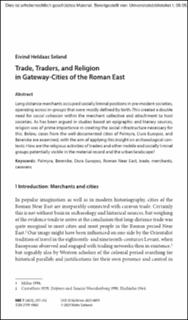Trade, Traders, and Religion in Gateway-Cities of the Roman East
Journal article, Peer reviewed
Published version

Åpne
Permanent lenke
https://hdl.handle.net/11250/2994441Utgivelsesdato
2021Metadata
Vis full innførselSamlinger
Sammendrag
Long distance merchants occupied socially liminal positions in pre-modern societies, operating across in-groups that were mostly defined by birth. This created a double need for social cohesion within the merchant collective and attachment to host societies. As has been argued in studies based on epigraphic and literary sources, religion was of prime importance in creating the social infrastructure necessary for this. Below, cases from the well-documented cities of Palmyra, Dura Europos, and Berenike are examined, with the aim of applying this insight on archaeological con- texts: How are the religious activities of traders and other mobile and socially liminal groups potentially visible in the material record and the urban landscape?